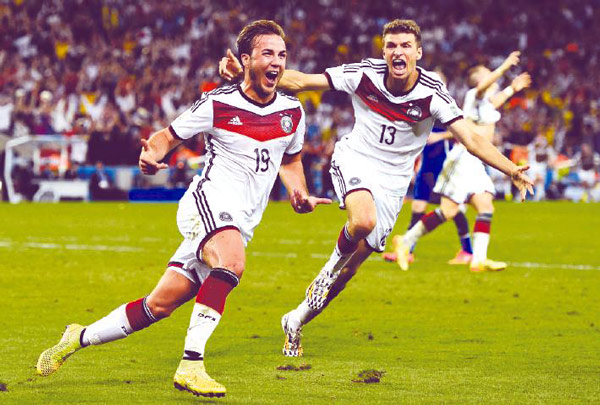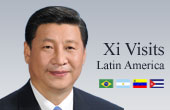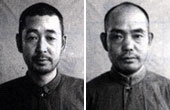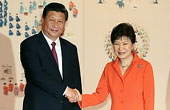World Cup has a big impact on Brazilian politics
By ZHANG FAN in Rio de Janeiro (China Daily Latin America) Updated: 2014-07-14 09:55
|
 Germany's Mario Goetze (left) celebrates near teammate Thomas Mueller after scoring a goal during extra time in their 2014 World Cup final against Argentina at the Maracana stadium in Rio de Janeiro on Sunday.[Photo/Agencies] |
The question that has been asked for days in Brazil and almost any corner in the world finally has an answer: Germany won the champion of the 2014 FIFA World Cup.
It is such a relief for Brazilians because people have started to celebrate not only in the stadium or FIFA Fan Fest but also in communities and on the streets. Some Brazilians are even waving the flag of Germany to express their happiness.

People who watched the semi-final on July 9 might feel confused because it was Germany who gave Brazil another"dark page" in the football history of the country by a 7-1 winning.Local media used "the defeat of defeats", "humiliation" and "massacre" to describe this game in the next day's headlines, combined with pictures of desperate Brazilian football fans.
Though it was Germany who delivered such a defeat to Brazil, local people still hope Germany wins the championship. "I definitely will support Germany," said Elieudo, a taxi driver in Rio de Janeiro. "Any country will be a better choice than Argentina to win the Cup."
Elieudo is not the only one. It seems to be a tradition for Brazilian football fans since the first rounds of the World Cup to cheer for whatever team is playing against Argentina. With the help of Brazilians, soccer teams from the Netherlands, Greece and even Japan all got warm support even though they were playing thousands of miles from home.
The animosity can be traced back to the 1937 South American Cup when Argentineans humiliated black Brazilian football players by calling them "monkeys". The game went down in Brazilian media history as "the game of humiliation".
Historical problems, racial issues and the prejudice all add up to today's tensions between Brazil and Argentina. Maybe this is why Neymar da Silva Santos Júnior, the core player of this Brazilian national team, has told the public that he will root for his friends from the Barcelona Football Club to win the game.
"I am so happy that Germany can win," said Zhang Hong, a Chinese working in Rio de Janeiro, " because I am afraid there might be chaos if Argentina won and our lives would be threatened."
Besides showing the world how they do not appreciate Argentina, Brazilians also take this opportunity to broadcast their disagreements with their own president, Dilma Rousseff. After their team fell to Germany, about 30,000 Brazilian fans sang a song, which, according to a Brazilian reporter who declined to be identified, disparaged the Brazilian government.
"They are cursing Dilma Rousseff," he said. "The song is very popular lately."
Dilma Rousseff, the first female president in Brazil's history, face the presidential election in three months. Although she still enjoys an approval rate of 44 percent in the most recent opinion survey, 18 percent ahead of her major competitor Aecio Neves, people are worried she may not get reelected if Argentina wins.
Though some experts believe Rousseff will not be affected by Argentina's possible wins, a recent survey from Sensus, a US information firm, show Rousseff's numbers declining after the game with Germany and Neves' increasing.
Alex Edmans, a professor from London Business School, did research that found that most countries' stock prices suffered a major drop after they lost a game in the 2014 World Cup, except for Brazil's, which increased after their 1-7 defeat to Germany.
"The loss is too bad and investors may hope it will help Neves replace Rousseff in the October election," said Edmans, because Neves' party "is more focused on economic development".
Since Rousseff took office in 2011, Brazil's economic growth rate has remained at 2 percent, lower than the average of 3.6 percent from 2001 to 2010.
Rousseff will meet the visiting Chinese President Xi Jinping at the sixth BRICS summit in Fortaleza, Brazil. The two countries' bilateral trade enjoyed rapid development during former president Luiz Inacio Lula da Silva and Rousseff's governance, who are both from the left wing Workers' Party (PT).










